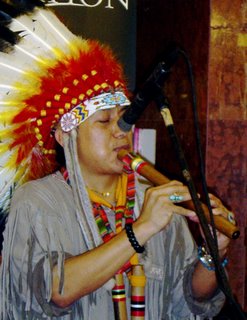Amazing... such a little tree with such significantly beautiful flowers... I can just imagine how stunning they'll look when they're in full bloom! Oh uhh... all right, let's get back to the possessive case.
 So what's with using the Possessive Case with Gerunds?
So what's with using the Possessive Case with Gerunds?
Read on and you tell me...The problems in the following sentences are identified in bold.1. I appreciate
you taking the time to read our year-end report.
2. The revised plan would result in the
family paying for services that previously would have been covered by the public insurance program.
3. All child safety seats must be properly installed to reduce the risk of a
child being injured.
In each of these sentences, we need to use the possessive case to modify a gerund.The correct phrases, then, are (1) “your taking” (2) “family’s paying,” and (3) “child’s being.”
But what’s a gerund?A gerund is a verbal i.e. a word formed from a verb, which retains certain characteristics of a verb
e.g. tenses and the ability to take an object, but no longer functions as that part of speech.
A gerund always functions as a noun.
It is formed by adding “ing” to the verb. Because a gerund functions as any other noun does, we must use the possessive case of nouns that modify it. For example, we’d write: “My sister’s singing always pleases my father.” Here, “singing” is the gerund and “sister’s” is the possessive noun modifying it.
2 central problems thus arise with regard to the use of the possessive case with the gerund:
1. The failure to use the possessive case with the gerund can give a sentence an entire different meaning.
Consider these two sentences:
(a) Chuan did not like the woman standing in front of him at the parade.
(b) Chuan did not like the woman’s standing in front of him at the parade.
In sentence (a), “standing” is an adjective modifying “woman.”
We call “standing in front of him at the parade” a participial phrase.
The sentence says that Chuan did not like the woman who was standing in front of him at the parade.
The participial phrase answers the question “which woman?”
It identifies her as “the standing woman” and states that she is the person whom Chuan did not like.
In sentence (b), “standing” is a noun- a gerund. This sentence says that Chuan did not like the fact that someone (the “woman”) was standing in front of him at the parade. Chuan probably did not know the woman at all. The notion of his liking or disliking her has nothing whatsoever to do with the idea that the sentence intends to convey.
It was the *standing in front of him* that Chuan did not like- the *woman’s* standing. The true meaning of the sentence- the fact that Chuan did not like having someone stand in front of him at the parade, hinges entirely on the use of the possessive case of the word “woman.”
2. The failure to use the possessive case with the gerund can create an illogical statement.
Consider the following sentence:
I appreciate you taking time to talk with me about the project.
The possessive case of “you” is not used with the gerund “taking” so the writer ends up making the illogical statement (in this context) “I appreciate you.” The point is not that the writer of the sentence appreciates *you* per se; instead, he or she appreciates the fact that you took time to talk with him or her: I appreciate *your* taking time to talk with me about the project.
More examples?1.
Each office wants to arrange its own schedule, but doing so would result in the *company’s* being inundated with calls and scheduling requests.This practice does not result in the company; it results in the inundation of the company i.e. in *its* being inundated.
2.
The principal may require the parents to come to the school for a conference prior to the *student’s* being allowed to resume riding the bus.The parents will not have to come to the school prior to the student; they will have to come before the student can be allowed to resume riding the bus i.e. prior to *his or her* being allowed to resume riding.
3.
What can we do about *others’* not being able to read well?The question is not what can we do about others but what can we do about the fact that they are not able to read well i.e. about *their* not being able to read well.
4.
Funding eligibility is contingent upon the *entity’s* meeting the financial reporting requirements.The eligibility is not contingent upon the entity but upon the fact that the entity meets the financial reporting requirements i.e. upon *its* meeting the requirements.]
Want to try?
Identify problems with gerunds in the following sentences:1. The tax incentive program has resulted in South Carolina gaining seventy new businesses in the northern coastal area.
2. The principal will notify the parents that any disruptive conduct will result in a student losing his or her hall privileges for the remainder of the school year.
3. An emergency technician had recorded vital signs prior to the patient receiving medical care.
4. The “employee of the month” award is based on an employee having demonstrated a strong work ethic, collegiality, and dedication to the company.
5. The board of directors realized that its actions were responsible for the company having lost $2.3 million in revenue during the fourth quarter.
ANSWERS1. The tax incentive program has resulted in South Carolina’s gaining seventy new businesses in the northern coastal area.
The incentive program has not resulted in South Carolina; instead, it has resulted in the *state’s* gaining seventy new businesses in the northern coastal area.2. The principal will notify the parents that any disruptive conduct will result in a student’s losing his or her hall privileges for the remainder of the school year.
The conduct will not result in the student; it will result in the loss of hall privileges by the student- in *his or her* losing the privileges.3. An emergency technician had recorded vital signs prior to the patient’s receiving medical care.
The technician did not record the vital signs prior to the patient; instead, he or she recorded vital signs prior to the *receiving* of the medical care.4. The “employee of the month” award is based on an employee’s having demonstrated a strong work ethic, collegiality, and dedication to the company.
The award is not based on the employee; instead, it is based on *his or her* having demonstrated certain qualities.5. The board of directors realized that its actions were responsible for the company’s having lost $2.3 million in revenue during the fourth quarter.
The sentence means to convey that the board was responsible not for the company per se but for *its* having lost revenue.













